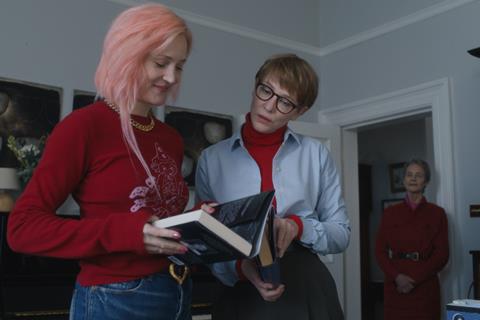Cate Blanchett, Adam Driver, Charlotte Rampling and Vicky Krieps are among the ensemble of Jarmusch’s Venice competition title

Dir/scr: Jim Jarmusch. USA/Ireland/France. 2025. 110mins
A little adds up to a lot in Jim Jarmusch’s first film in six years – a triptych of quiet, sometimes sad, sometimes funny stories about families, deeply human tales which reveal worlds in the spaces between words. If Father Mother Sister Brother feels like a small but significant step forward for the director, that’s partly because this doesn’t immediately announce itself as a Jarmusch film. It’s a work of pared-back humanism in which the cineaste from Ohio, now in his 70s, finally goes full Ozu, but it also feels, at times, like the work of a younger director with an appetite for the expressive potential of slow cinema.
A film of quiet charm, anchored by a scatter of joyful performances
Ravishingly framed and lit by two DoPs at the top of their games – Frederick Elmes, who shot ’Father’, and Yorick Le Saux, who took on the other two parts, ’Mother’ and ’Sister Brother’ – Jarmusch’s latest requires patience. It’s a film that takes its own sweet time; audiences are encouraged to to contemplate, to pick up loose threads and tie them together. Pre-sold to a raft of territories ahead of its Venice competition bow, with Mubi securing for several including North America and UK/Ireland, Father Mother Sister Brother cries out to be seen in cinemas, where its blend of star power and staying power should attract appreciative audiences.
Jarmusch has done anthology movies before – Mystery Train (1989), Night on Earth (1991), Coffee and Cigarettes (2003). More recently, Paterson (2016) shared the celebration of unheroic ordinary lives that also runs through Father Mother Sister Brother. But the sentimentality that more than once curdled into tweeness in Paterson is replaced here by something more valuable: sensibility.
Each of the three evenly-distributed episodes deals with the rapport between adult siblings and their parents. The first, announced by the title ‘Father’, charts the visit of Adam Driver’s emotionally locked-down Jeff and his smart, reserved sister Emily (Mayim Bialik) to their father’s house somewhere in the New England woods. It becomes clear during a long hood-cam drive-and-talk intro that they don’t see him – or each other – much. They worry about dad, because he lives alone and has no visible source of income. With his disheveled appearance and hoarder’s house full of junk, Tom Waits’ unnamed father certainly seems to live up to his children’s expectations. But maybe, the episode wrily suggests, that’s because he knows what those expectations are?
Set in suburban Dublin, ‘Mother’ follows another parental duty visit – that of two mismatched sisters, Cate Blanchett’s prim and proper Tim (short for Timothea) and Vicky Krieps’ flamboyant, pink-haired Lilith, to their impeccably bourgeois mother (Charlotte Rampling), who has invited her daughters for tea – a formal, stilted sit-down affair with beautifully cut sandwiches and a bewildering array of cutlery.
In the third section, ‘Brother Sister’, a pair of twins meet in Paris, where they were born and raised, some time after the death of their parents in a plane crash. When Billy (Luka Sabbat) takes his sister Skye (Indya Moore) for one final view of the Parisian apartment in which they grew up, there’s sadness as always in empty rooms. But, paradoxically, this place devoid of clutter is the trilogy’s warmest interior, because it’s here that charts a way forward from the tender, absurd, tragic family stalemates of the first two episodes.
Father Mother Sister Brother is full of understated details. Some, loved up by the lambent photography, simply revel in beauty – a lake in winter as seen from a rocking chair, sun on Dublin brick, coffees enjoyed in a bar in Paris. Others are delicately devastating; like the revelation that Billy’s storage unit contains boxes of never-sorted stuff that the twins’ deceased parents inherited from their own deceased parents. And others are hilarious – like the centrally-placed vase of flowers that blocks eye contact in the Dublin tea scene.
Recurring themes become tendrils that bind the three parts together and blossom into jokes: one, in this film co-produced by fashion brand offshoot Saint Laurent, has to do with unplanned matching shades of plum or scarlet in clothes and accessories; another circles around water; and there’s a random repetition of the British expression ‘Bob’s your uncle’. Perhaps the most ‘why the hell not?’ Jarmusch-esque touch is the appearance of a classic car in each episode – like the handsome old Volvo 1800ES of the final section.
The director’s latest has a lot to say about families and generational relationships, but this is also a film of quiet charm, anchored by a scatter of joyful performances. Cate Blanchett plays Tim as if she’s Julie Andrews cast in a Harold Pinter play, Tom Waits has great fun dosing out the gradual audience revelation that he’s an elderly teenager wondering how his boring-as-hell kids got so old, while Indya Moore and Luka Sabbat smoulder as cool, cosmopolitan twins who know each other as well as they know themselves.
Production companies: badjetlag inc., CG Cinema, Hail Mary Pictures
International sales: The Match Factory
Producers: Charles Gillibert, Joshua Astrachan, Carter Logan, Atilla Salih Yücer
Production design: Mark Friedberg, Marco Bittner Rosser
Editing: Affonso Goncalves
Cinematography: Frederick Elmes, Yorick Le Saux
Music: Jim Jarmusch and Annika
Main cast: Tom Waits, Adam Driver, Mayim Bialik, Charlotte Rampling, Cate Blanchett, Vicky Krieps, Sarah Greene, Indya Moore, Luka Sabbat























